

Cyberaction Pour la remise en ligne de l’article de GE Seralini. Cyberaction N° 592: Pour la remise en ligne de l’article de GE Seralini.
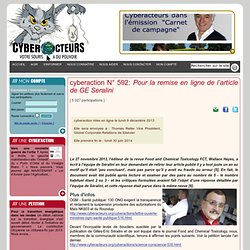
Une presse scientifique sous influence : l’exemple de l’étude sur le maïs OGM NK603. OGM : un retour en force du lobby pro-OGM ! Réponse du CRIIGEN - nov. 2013. Golden Holocaust, la conspiration du tabac - Robert Proctor.
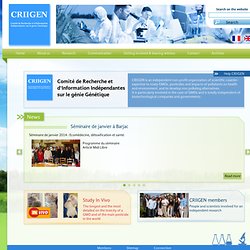
Ratted out: Scientific journal bows to Monsanto over anti-GMO study — RT Op-Edge. William Engdahl is an award-winning geopolitical analyst and strategic risk consultant whose internationally best-selling books have been translated into thirteen foreign languages.

Published time: December 02, 2013 12:34 AFP Photo / Evaristo Sa Rigid criteria exist for a serious scientific journal to accept a peer-reviewed paper and to publish it. Sommé de retirer son article scientifique par le journal qui l’a publié, Séralini refuse. Journal retraction of Séralini study is illicit, unscientific, and unethical. Editor's decision violates scientific publication ethics.
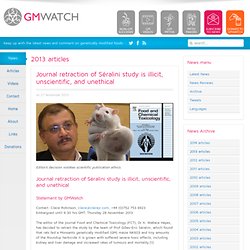
Statement by GMWatch Contact: Claire Robinson, claire@clairejr.comThis email address is being protected from spambots. You need JavaScript enabled to view it. ; +44 (0)752 753 6923Embargoed until 9:30 hrs GMT, Thursday 28 November 2013 The editor of the journal Food and Chemical Toxicology (FCT), Dr A. Criticism: Séralini’s study does not conform to internationally accepted protocols - GMO Seralini. Summary answer: No mandatory protocols exist for GM food safety testing.
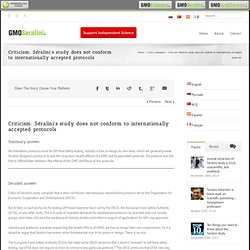
Industry is free to design its own tests, which are generally weak. Séralini designed a protocol to test the long-term health effects of a GMO and its associated pesticide. His protocol was the first to differentiate between the effects of the GMO and those of the pesticide. Detailed answer: Critics of Séralini’s study complain that it does not follow internationally standardized protocols set by the Organisation for Economic Cooperation and Development (OECD). But in fact, no such protocols for testing GM foods have ever been set by the OECD, the European Food Safety Authority (EFSA), or any other body. Industry and academic scientists researching the health effects of GMOs are free to design their own experiments. OGM : la publication du Pr Séralini va être retirée, ses partisans s’insurgent. Seralini Refuses to Retract GM Maize Tumor Study. For related articles and more information, please visit OCA's Genetic Engineering page and our Millions Against Monsanto page.
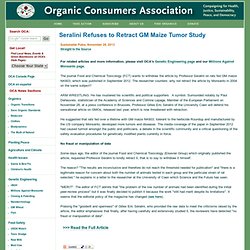
The journal Food and Chemical Toxicology (FCT) wants to withdraw the article by Professor Seralini on rats fed GM maize NK603, which was published in September 2012. The researcher counters: why not retract the article by Monsanto in 2004 on the same subject? ARM WRESTLING. He has mustered his scientific and political supporters A symbol. Surrounded notably by Paul Deheuvels, statistician of the Academy of Sciences and Corinne Lepage, Member of the European Parliament on November 28, at a press conference in Brussels, Professor Gilles Eric Séralini of the University Caen will defend his sensational article on GMOs, released last year, which is now threatened with retraction.
Seralini Refuses to Retract GM Maize Tumor Study. The journal Food and Chemical Toxicology (FCT) wants to withdraw the article by Professor Seralini on rats fed GM maize NK603, which was published in September 2012.
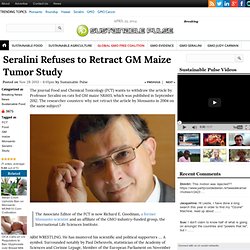
The researcher counters: why not retract the article by Monsanto in 2004 on the same subject? The Associate Editor of the FCT is now Richard E. Goodman, a former Monsanto scientist and an affiliate of the GMO industry-funded group, the International Life Sciences Institute. ARM WRESTLING. He has mustered his scientific and political supporters … A symbol. Shocker: Prof. Gilles-Eric Séralini, GMO-Cancer Researcher, Blows Whistle on Biotech Fraud. In this shocking interview, Professor Gilles-Eric Séralini, discusses the dangers of GMOs, the manipulation of the biotech science, and related issues.
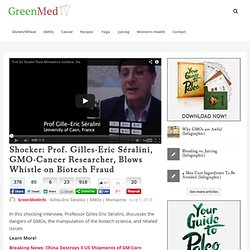
Learn More! In a sudden turn of events, three separate incidents of Chinese authorities identifying and destroying illegally imported GM corn from the United States have been reported. A shocking new study finds that glyphosate, the active ingredient in Roundup herbicide, “…may be the most biologically disruptive chemical in our environment,” capable of contributing to a wide range of fatal human diseases. GMO farming practices heavily dependent upon glyphosate herbicide formulations such as Roundup have serious, unintended adverse effects on human and environmental health. New research indicates glyphosate does not break down rapidly, as the manufacturer claimed, but is accumulating in the groundwater -the source for most of the world’s drinking water. Rat retraction reaction: Journal pulls its GMOs-cause-rat-tumors study. When a 2012 study came out suggesting that a certain type of genetically modified corn caused cancer in rats, many were skeptical.
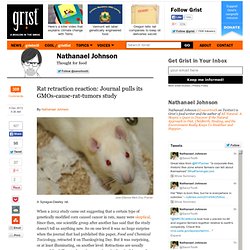
Since then, one scientific group after another has said that the study doesn’t tell us anything new. So on one level it was no huge surprise when the journal that had published this paper, Food and Chemical Toxicology, retracted it on Thanksgiving Day. But it was surprising, or at least illuminating, on another level: Retractions are usually reserved for deliberate deception or major mistakes; in this case, the reason for retraction was simply insignificance.
In a statement the journal publishers wrote: “Ultimately, the results presented (while not incorrect) are inconclusive, and therefore do not reach the threshold of publication for Food and Chemical Toxicology.” What does it mean that a “not incorrect” but “inconclusive” paper fails to “reach the threshold”? First, a quick review of the study and the blowback. The critiques came from all over.